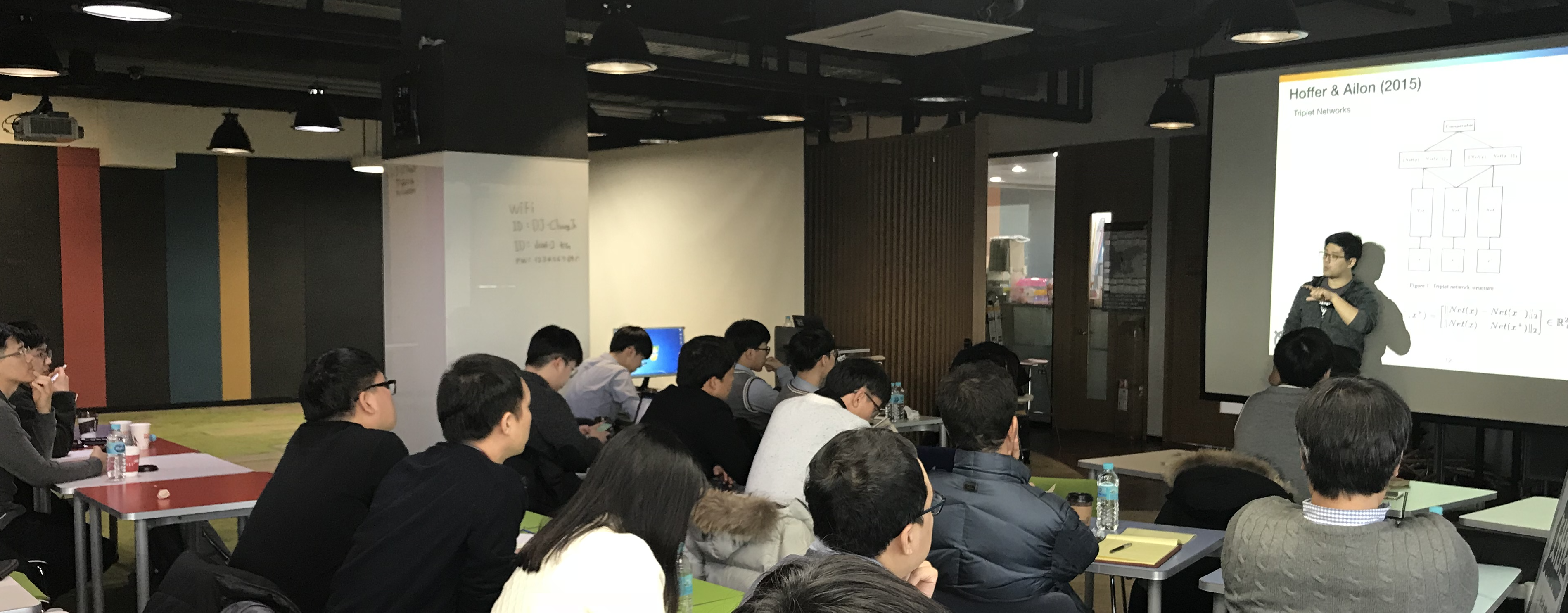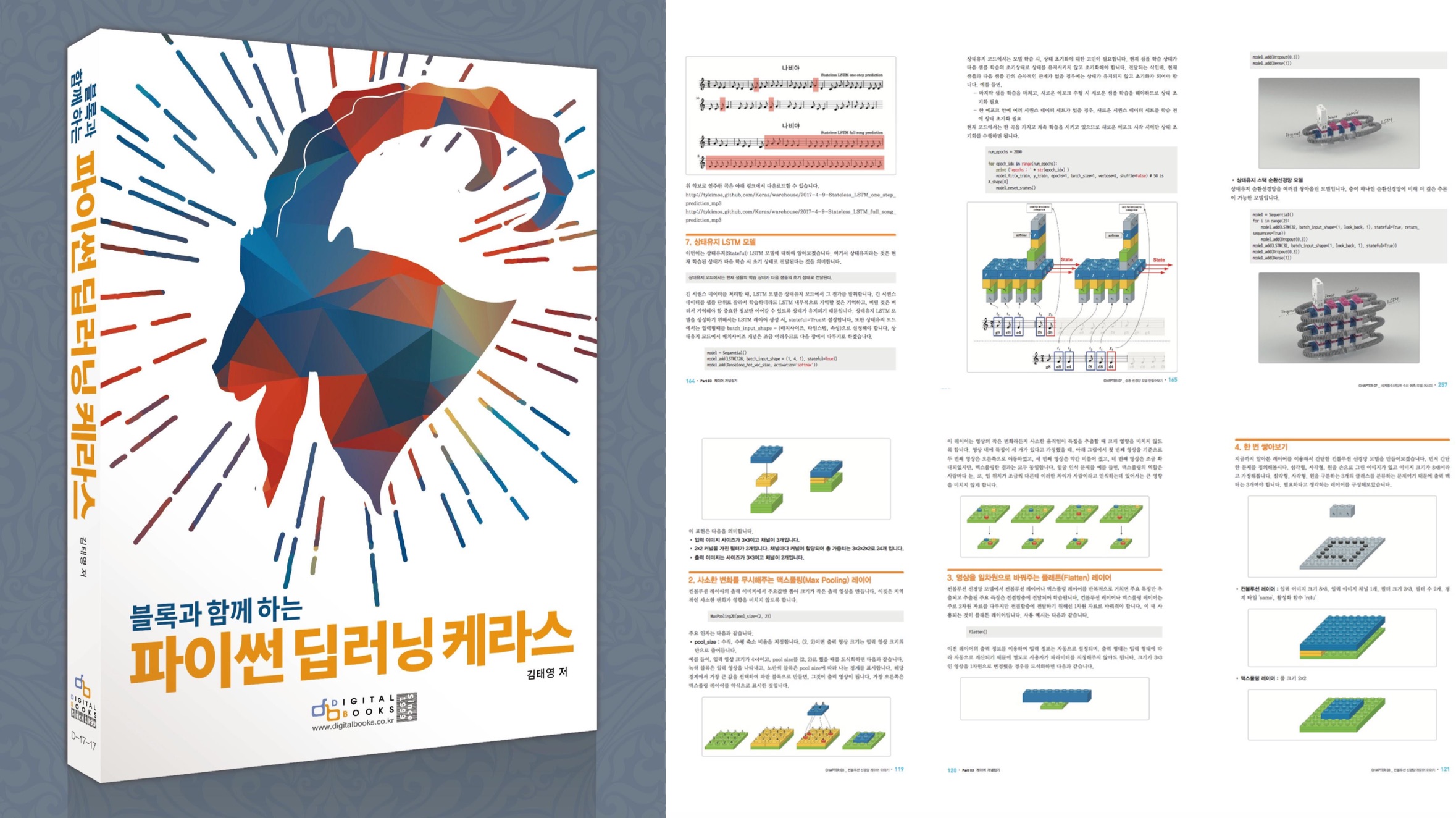[ISS 세미나] 최성준님, 딥러닝 최신동향
딥러닝 기술은 하루가 멀다하고 발전하고 있습니다. 이번 ISS에서는 Google Developer Expert이시고 서울대학교 사이버물리시스템 연구실 박사과정에 계신 최성준님이 ‘딥러닝 최신 동향’이란 주제로 발표하셨습니다. 열정적으로 강의해주신 최성준님께 감사드리고, 장시간 동안 끝까지 관심있게 들어주시고 좋은 질문 많이해주신 참석자분들에게 감사드립니다.
ISS란 Intelligence Space Semiar의 약자로 인공지능 기술과 관련된 인스페이스의 사내 세미나를 말합니다. 어렵게 모신 전문가분들의 주옥같은 내용을 공유하고자 오픈 세미나로 진행하고 있습니다.

개요
딥러닝 분야에서 다루고 있는 연구 주제에 대해서 간략히 살펴보고, 본 세미나에서 다룰 네 가지 주제(Generative Model, Domain Adaptation, Meta Learning, Uncertainty in Deep Learning)를 소개합니다.
Generative Model
VAE와 GAN의 기본과 여러가지 GAN에 대해서 살펴봅니다. GAN의 발전속도와 활용성을 보니 신기할 따름이네요. 발표에서 다룬 논문들은 다음과 같습니다.
- Generative Adversarial Network (GAN), Goodfellow et al. (2014)
- Variational Autoencoder (VAE), Kingma (2017)
- DCGAN, Radford et al. (2016)
- Info GAN, Chen et al. (2016)
- Text2Image, Reed et al. (2016)
- Pix2pix, Isola et al. (2017)
- PatchGAN, Li and Wand (2016)
- Generative Adversarial What-Where Networks (GAWWN), Reed et al. (2016)
- Puzzle-GAN, Lee et al. (2017)
- Domain Transfer Network, Taigman et al. (2016)
- DiscoGAN, Kim et al. (2017)
- CycleGAN, Zhu et al. (2017)
- StarGAN, Choi et al. (2017)
- Progressive GAN, Karras et al. (2017)
Domain Adaptation
데이터를 비교적 얻기 쉬운 도메인에서 학습한 모델을 어떻게 우리가 적용하고자 하는 도메인에서 활용해볼 수 있을까에 대한 연구 소개 입니다. 위닝일레븐 잘 하시는 분이 진짜 축구를 잘 할 수 있다는… 발표에서 다룬 논문들은 다음과 같습니다.
- Analysis for domain adaptation, Ben-David et al. (2006)
- Domain Adversarial Neural Network (DANN), Ganin et al. (2016)
- Domain Separation Network (DSN), Bousmalis et al. (2016)
- Coupled Generative Adversarial Network (CoGAN), Liu & Tuzel (2016)
- Adversarial Discriminative Domain Adaption, Tzeng et al. (2017)
- Addressing Appearance Change in Outdoor Robotics with Adversarial Domain Adaption, Wulfmeier et al. (2017)
- Unsupervised Pixel-Level Domain Adaptation with Generative Adversarial Networks, Bousmalis et al. (2017)
- Associative Domain Adaptation, Haeusser et al. (2017)
Meta Learning
배우는 방법을 배우는 모델인데, 다소 생소할 수 있지만, 우리도 어떤 과목을 공부하지만 공부 잘하는 법 자체도 공부하기도 했었죠? 바로 그것입니다. 자동화된 딥러닝 모델로 보시면 될 듯 합니다. 이게 발전되면 더이상 딥러닝 모델을 만들 필요가 없습니다. 딥러닝 모델이 문제를 보고 적당한 딥러닝 모델을 만들테니깐요.
- Learning to Learn without Gradient Descent by Gradient Descent, Chen (2017)
- Siamese Neural Networks for One-shot Image Recognition, Koch et al. (2015)
- Deep Metric Learning using Triplet Network, Hoffer & Ailon (2015)
- Meta-Learning with Memory-Augmented Neural Networks, Santoro et al. (2016)
- Metching Networks for One Shot Learning, Vinyals et al. (2017)
- Prototypical Networks for Few-shot Learning, Snell et al. (2017)
- Low-shot Visual Recognition by Shrinking and Hallucinating Features, Hariharan & Girshick (2017)
- Model-Agnostic Meta-Learning, Finn et al. (2017)
Uncertainty in Deep Learning
딥러닝 모델은 4지선다문제에서 찍기만 할 뿐입니다. 모르겠다고 고개를 흔드는 법은 없죠. 하지만 실무에서는 딥러닝에서 불확실하다는 것은 불확실하다고 알리고 사람에게 넘기길 원할 때가 많습니다. 하지만 딥러닝 모델에서 불확실성을 알기란 쉽지 않습니다. 이 불확실성에 대한 연구를 소개합니다. 발표에서 다룬 논문들은 다음과 같습니다.
- Uncertainty in Deep Learning, Gal (2016)
- Representing Inferential Uncertainty in Deep Neural Networks Through Sampling, McClure & Kriegeskorte (2017)
- Uncertainty-Aware Reinforcement Learning from Collision Avoidance, Khan et al. (2016)
- Simple and Scalable Predictive Uncertainty Estimation using Deep Ensembles, Lakshminarayanan et al. (2017)
- What Uncertainties Do We Need in Bayesian Deep Learning for Computer Vision?, Kendal & Gal (2017)
- Uncertainty-Aware Learning from Demonstration Using Mixture Density Networks with Sampling-Free Variance Modeling, Choi et al. (2017)
- Bayesian Uncertainty Estimation for Batch Normalized Deep Networks, Anonymous (2018)
uncertainty-in-deep-learning.pdf
Interpretable Deep Learning
딥러닝 모델이 높은 성능을 보이고 있지만 그 속은 블랙박스라고 여겨져왔습니다. 딥러닝 분야 연구자들인 딥러닝 모델을 해석하고자 하는 노력을 해왔고, 조금씩 사람이 이해할 수 있는 방안에 대해서 결과나 나오기 시작했습니다. 이번 발표에서는 다루지 않았지만 발표자로를 추가로 공유해주셨고 다음 논문들이 포함되어 있습니다.
- Visualizing and Understanding Convolutional Networks, Zeiler & Fergus (2013)
- Deep Inside Convolutional Networks: Visualising Image Classification Models and Saliency Maps, Simonyan et al. (2014)
- Learning Deep Features for Discriminative Localization, Zhou et al. (2016)
- Grad-CAM, Selvaraju et al. (2017)
- Interpretable Explanations of Black Boxes by Meaningful Perturbation, Fong & Vedaldi (2017)
- Learning Important Features Through Propagating Activation Difference, Shrikumar et al. (2017)
interpretable-deep-learning.pdf
같이 보기
책 소개

[추천사]
- 하용호님, 카카오 데이터사이언티스트 - 뜬구름같은 딥러닝 이론을 블록이라는 손에 잡히는 실체로 만져가며 알 수 있게 하고, 구현의 어려움은 케라스라는 시를 읽듯이 읽어내려 갈 수 있는 라이브러리로 풀어준다.
- 이부일님, (주)인사아트마이닝 대표 - 여행에서도 좋은 가이드가 있으면 여행지에 대한 깊은 이해로 여행이 풍성해지듯이 이 책은 딥러닝이라는 분야를 여행할 사람들에 가장 훌륭한 가이드가 되리라고 자부할 수 있다. 이 책을 통하여 딥러닝에 대해 보지 못했던 것들이 보이고, 듣지 못했던 것들이 들리고, 말하지 못했던 것들이 말해지는 경험을 하게 될 것이다.
- 이활석님, 네이버 클로바팀 - 레고 블럭에 비유하여 누구나 이해할 수 있게 쉽게 설명해 놓은 이 책은 딥러닝의 입문 도서로서 제 역할을 다 하리라 믿습니다.
- 김진중님, 야놀자 Head of STL - 복잡했던 머릿속이 맑고 깨끗해지는 효과가 있습니다.
- 이태영님, 신한은행 디지털 전략부 AI LAB - 기존의 텐서플로우를 활용했던 분들에게 바라볼 수 있는 관점의 전환점을 줄 수 있는 Mild Stone과 같은 책이다.
- 전태균님, 쎄트렉아이 - 케라스의 특징인 단순함, 확장성, 재사용성을 눈으로 쉽게 보여주기 위해 친절하게 정리된 내용이라 생각합니다.
- 유재준님, 카이스트 - 바로 적용해보고 싶지만 어디부터 시작할지 모를 때 최선의 선택입니다.